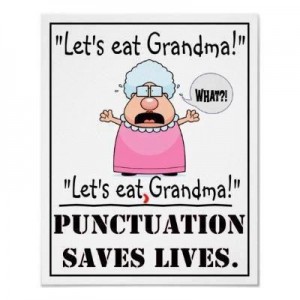A short video explaining when you should use the passive voice!
The Importance of Punctuation
Phrasal verb: call off
- call something off
Transitive, Separable
Meaning: cancel
Example: He called the wedding off because he was having doubts.
Did you know that 10-15% of weddings are called off annually? And the bride calls off about 75% of them!
Phrasal verb: bring up
- bring someone up
Transitive, Separable (in some cases)
Meaning: raise a child
Example: My aunt and uncle brought me up after my parents passed away.
Did you know that 2% of children in the United States are adopted and brought up by parents that don’t share the same genes?
2. bring something up
Transitive, Separable
Meaning: start talking about a subject
Example: She always brings up her wedding when I talk to her.
Phrasal verb: sort out
- sort something out
Transitive, Separable
Meaning: to organize, resolve a problem
Example: We need to sort everything out before we can move forward.
Do you think that men or women are better at sorting things out?
Why Men Should Not Write Advice Columns—something funny I found on the Internet (http://www.bspcn.com/2009/12/11/why-men-should-not-write-advice-columns/)
Dear Mr. Helpful,
I hope you can help me. The other day I left for work leaving my husband in the house watching TV as usual. I hadn’t gone more than a mile down the road when my car stopped moving. I walked back home to get my husband’s help. When I got home I couldn’t believe my eyes. He was in the bedroom with the neighbor making love to her. My husband and I have been married for twelve years. When I confronted him, he admitted that he’d been having an affair for the past six months. I told him to stop or I would leave him. I love him very much, but since I said this he has become distant. I don’t feel like I can talk to him anymore.
Can you please help?
Sincerely,
Concerned wife
—
Dear Concerned wife,
A car stopping after being driven a short distance could have been caused by a problem with the engine. You should have called a mechanic! Next time this happens, you should start by checking that nothing is caught inside the fuel line. If it is clear, you should check under the hood of the car. If this does not solve the problem, it could be that the fuel pump is broken. I hope this helps!
Good luck,
Mr. Helpful
Happy Birthday William Shakespeare!
Did you know that Shakespeare invented over 1500 English words? Some of these words include: eyeball, alligator, generous, frugal, hurry, and lonely.
He also coined some popular phrases such as:
- “Fair play” (The Tempest) – Follow the rules, especially in competitions or sports.
- “All that glitters isn’t gold” (Merchant of Venice) – We usually use this phrase after we discover the fact that something that looks good turns out not to be that great.
- “Wear one’s heart on one’s sleeve” (Othello) – To be a hopeless romantic (or be open and honest about how you feel) is to wear one’s heart on one’s sleeve.
- “Break the ice” (The Taming of the Shrew) – Often when you meet someone for the first time, you “break the ice” by asking them questions about themselves.
- “A laughing stock” (The Merry Wives of Windsor) – To be a laughing stock is to be considered a joke by many people.
- “Too much of a good thing” (As You Like It) – It is said that “too much of a good thing” (i.e. money, love, food) is not necessarily good for you.
- “In a pickle” (The Tempest) – To be “in a pickle” is to be in trouble or a situation that you cannot easily get out of.
(http://grammar.yourdictionary.com/word-lists/list-of-words-and-phrases-shakespeare-invented.html)
Are you in amazement? The word “amazement” was also first introduced by Shakespeare!
For a list of some more words introduced into the English language by Shakespeare, visit: http://www.nosweatshakespeare.com/resources/shakespeare-words/
Phrasal verb: drop in/by/over
- drop in/by/over
Intransitive
Meaning: come without an appointment
Example: I might drop in/by/over to chat sometime this week.
Do you like it when people drop by unexpectedly, or would you prefer that they called first?
Learn about the difference between “very” and “too”
I am VERY excited that you found my blog! I hope that it wasn’t TOO difficult for you.
Learn about the difference between “very” and “too”:
Phrasal verb: bring down
- bring someone down
Transitive
Meaning: make unhappy / to cause to fail (transitive, separable)
Example: Sometimes watching the news can bring me down. - cheer up
Transitive, Intransitive, Separable
Meaning: become happier
Example: She cheered up when her friend surprised her with ice cream. Her friend cheered her up with ice cream.
If something is bringing you down, here’s something to cheer you up: http://www.buzzfeed.com/mjs538/moments-that-restored-our-faith-in-humanity-this-y

